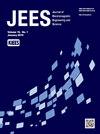Design of Compact Fragment-Type Antenna Array for Microwave-Based Head Imaging Application
IF 1.7
3区 工程技术
Q3 ENGINEERING, ELECTRICAL & ELECTRONIC
Journal of electromagnetic engineering and science
Pub Date : 2023-06-19
DOI:10.26866/jees.2023.4.r.176
引用次数: 1
Abstract
Specifically designed antennas are needed to meet the needs of head imaging applications where an antenna array is typically used. In this article, the design of a compact fragment-type antenna using a genetic algorithm is proposed. The proposed antenna is fabricated by a low-cost FR4 substrate and covers a 72.4% fractional bandwidth (1.92 to 4.1 GHz), with an average gain of more than 2.02 dBi. The overall structure of the proposed antenna is equivalent to 0.29 λ 0 × 0.19 λ 0, where λ 0 is the corresponding wavelength at 1.92 GHz. The results indicate that the proposed antenna is compact and suitable for microwave-based head imaging. An effective microwave head imaging system with an array of 8 compact fragment-type antennas is designed, with one antenna working as a transmitter and the others working as a receiver in turn. The imaging performance is investigated with blood layer inside the head model using the Microwave Radar-Based Imaging Toolbox open-source software. The detection of the presence and location of stroke is done by analyzing the compact fragment-type antennas’ backscattered signal.用于微波头部成像应用的小型碎片型天线阵列设计
需要专门设计的天线来满足通常使用天线阵列的头部成像应用的需求。提出了一种基于遗传算法的紧凑型片式天线的设计方法。该天线由低成本的FR4衬底制成,覆盖72.4%的分数带宽(1.92至4.1 GHz),平均增益超过2.02 dBi。该天线的整体结构相当于0.29 λ 0 × 0.19 λ 0,其中λ 0为1.92 GHz的对应波长。结果表明,该天线结构紧凑,适合微波头部成像。设计了一种有效的微波头部成像系统,该系统由8个紧凑的碎片型天线阵列组成,其中一个天线作为发射器,另一个天线依次作为接收器。利用开源软件微波雷达成像工具箱(Microwave Radar-Based imaging Toolbox)研究了头部模型内部血液层的成像性能。通过分析紧凑碎片型天线的后向散射信号来检测冲程的存在和定位。
本文章由计算机程序翻译,如有差异,请以英文原文为准。
求助全文
约1分钟内获得全文
求助全文
来源期刊

Journal of electromagnetic engineering and science
ENGINEERING, ELECTRICAL & ELECTRONIC-
CiteScore
2.90
自引率
17.40%
发文量
82
审稿时长
10 weeks
期刊介绍:
The Journal of Electromagnetic Engineering and Science (JEES) is an official English-language journal of the Korean Institute of Electromagnetic and Science (KIEES). This journal was launched in 2001 and has been published quarterly since 2003. It is currently registered with the National Research Foundation of Korea and also indexed in Scopus, CrossRef and EBSCO, DOI/Crossref, Google Scholar and Web of Science Core Collection as Emerging Sources Citation Index(ESCI) Journal. The objective of JEES is to publish academic as well as industrial research results and discoveries in electromagnetic engineering and science. The particular scope of the journal includes electromagnetic field theory and its applications: High frequency components, circuits, and systems, Antennas, smart phones, and radars, Electromagnetic wave environments, Relevant industrial developments.
 求助内容:
求助内容: 应助结果提醒方式:
应助结果提醒方式:


